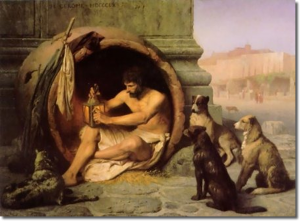a fondness for argument
Socrates taught of a restless mind, a mind so restless that it would question and examine the self, thus laying the foundation for scientific and spiritual advancement. Saint Augustine went further saying, “If you would attain to what you are not yet, you must always be displeased by what you are. For where you are pleased with yourself there you have remained. Keep adding, keep walking, keep advancing.”

Cynic
Sadly we have become all too pleased with where we are—we have ceased adding, walking, or advancing. Our minds have become moribund masses of mindless mediocrity, all too easily pleased with ourselves, satisfied with what we think we know and not in the least restless to question or examine the truth or fullness of it.
Oscar Wilde once wrote that “The cynic knows the price of everything, and the value of nothing.” [1] Ancient cynics put no trust in the possibility of attaining higher knowledge. Interestingly, the term ‘cynic’ comes from the Greek κύων (kyôn) which means ‘dog’.
Father George Rutler writes “The classical cynic saw knowledge as tragic. This was an abuse of the Socratic idea of discontent…The ancient cynici believed in the virtues as the total reference for all living and knowing, to the extent of rejecting the worldly allurements of money, power, physical fitness, and celebrity—that is, all the gods of the modern university. So, by rejecting the virtues, modern Cynicism has become shabby burlesque of its ancient source.” [3]
He continues “Political correctness, by which I mean conformity to popular prejudice, has embedded itself in the schools which were meant to be engines of its refutation.”
Our universities no longer attend to the question “What is truth?” through honest debate but entertain a cynical form defined as ‘Eristic Argument’ whose aim is to dispute another’s argument rather than discerning truth. Its purpose is to argue for the sake of conflict rather than to resolve it, to confuse and denigrate rather than defend one’s own view.
As Father Rutler writes “The more any system debases truth, the more it will debase language. If thinking is not important, then the ability to express thought declines, and so now we have widespread the remarkable inarticulateness of today’s generation: ‘You know, you, know, I mean, like.’”
Or as George Orwell wrote “A man may take to drink because he feels himself to be a failure, and then fail all the more completely because he drinks. It is rather the same thing that is happening to the English language. It becomes ugly and inaccurate because our thoughts are foolish, but the slovenliness of our language makes it easier for us to have foolish thoughts.” [4]
[1] Oscar Wilde, Lady Windermere’s Fan: A Play About a Good Woman, 1892.
[2] R. Dudley, A History of Cynicism from Diogenes to the 6th Century A.D., Cambridge University Press, 1937.
[3] George William Rutler, Disorientation: How To Go To College Without Losing Your Mind, Essay on Cynicism, Ascension Press, December 21, 2010.
[4] George Orwell, Politics and the English Language, Horizon, London, April 1946.
